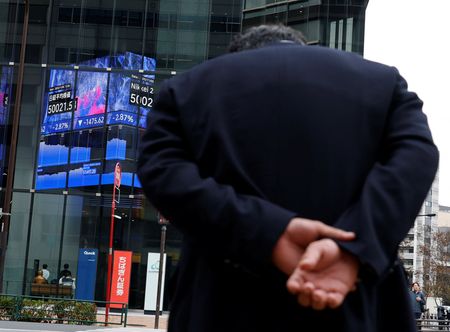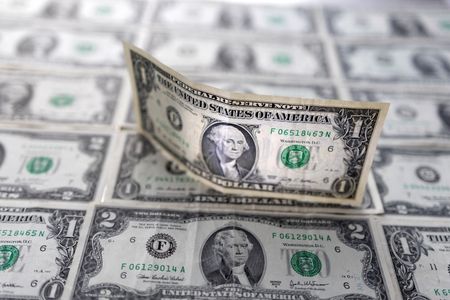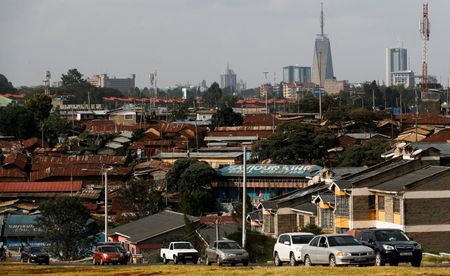By Amanda Cooper
LONDON (Reuters) -Stocks fell on Wednesday, as a selloff in global tech shares dragged down markets from Tokyo to Frankfurt, driving volatility to highs last seen in April and helping underpin safe-haven assets like gold and government bonds.
Asia stocks were hit particularly hard overnight, pushing Japan’s Nikkei down nearly 7% from Tuesday’s record highs at one point, while shares in South Korea plunged as much as 6.2% before clawing back some losses to be down 2.9%.
In Europe, tech was the worst-performing sector of the STOXX 600, which dropped 0.3% on the day, while Germany’s DAX fell 0.7% and Amsterdam’s AEX index, home to Nvidia supplier ASML fell 0.3%.
U.S. e-mini futures slid 0.1% to extend losses after a 1.2% drop for the S&P 500 overnight.
STOCKS RETREATING FROM RECORD HIGHS
Stocks are retreating from record highs on fears equity markets may have become overstretched after the CEOs of Wall Street heavyweights Morgan Stanley and Goldman Sachs questioned whether sky-high valuations can be sustained.
Lombard Odier economist Samy Chaar said the overall backdrop remained supportive to equities, given that interest rates will continue to fall, while economic growth mostly holds up.
“Statistically speaking, we’ve had a couple of good years, so there is some anxiety here. The data’s still okay, governments are spending, central banks are cutting,” he said.
“Earnings are (around) 9% above what was expected initially. The private sector is doing well. Of course, valuations are super, super demanding. So there is no room for comfort, or error here,” he said.
Last month, banking giant JPMorgan Chase’s CEO Jamie Dimon had warned of a heightened risk of a significant correction in the U.S. stock market within the next six months to two years.
The warnings come as a surge in enthusiasm for generative AI has swept across stock markets worldwide this year, drawing comparisons to the dotcom bubble.
“At some point, profits need to be booked. Especially when we’ve seen repeatedly solid runs to record highs,” said Matt Simpson, senior market analyst at StoneX in Brisbane. “Those with money on the line aren’t likely seeking answers right now – they’re just copying each other like kids in an exam. And the answer is to run.”
In premarket trading, shares in AMD and Super Micro Computer fell 4.3% and 9%, respectively, while Big Tech shares showed more stability, with Meta up 0.2% and Nvidia down 0.7%.
Chinese shares rose 0.2% as the State Council’s tariff commission said it would suspend its 24% additional tariff on U.S. goods for one year but retain a 10% levy following last week’s meeting between President Xi Jinping and U.S. President Donald Trump.
In currencies, the dollar was also steady, having fallen overnight against the safe-haven yen before paring those losses to trade at 153.695, almost unchanged on the day, after the release of minutes from the Bank of Japan’s September policy meeting.
The euro was last a shade firmer at $1.1484, having hit a three-month low following five straight days of declines, while the pound was up 0.12% at $1.3036, after dropping to its lowest since April the day before, after finance minister Rachel Reeves seemingly paved the way for tax rises in her upcoming budget in a speech on Tuesday.
Among safe-haven assets, gold rose nearly 1% to $3,963 an ounce, while U.S. Treasury prices also retained some of their overnight gains, which kept the yield on benchmark 10-year notes steady at 4.09%.
Bitcoin fell below $100,000 for the first time since June in choppy trading. It was last up 1.65% at $101,943.
(Additional reporting by Gregor Stuart Hunter in SingaporeEditing by Shri Navaratnam, Lincoln Feast, Peter Graff)











